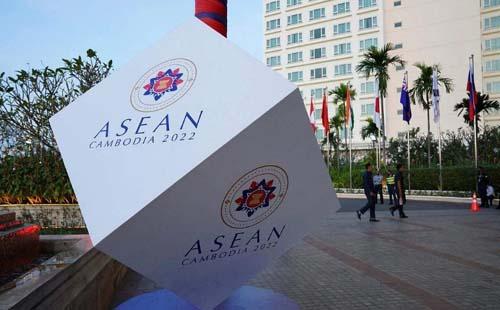
ASEAN summit signals Europe’s focus on Asia-Pacific
Andrew Hammond
Many headlines have been made this year by the intensified US focus on the Asia-Pacific region, including at the recent Asia-Pacific Economic Cooperation Summit in Thailand. Meanwhile, the increasing attention that the EU is devoting to the world’s fastest-growing economic region is often overlooked.
A new signal of intent from Brussels toward the Asia-Pacific will come this month, with the first ever summit of the EU and Association of Southeast Asian Nations. The EU and ASEAN have been dialogue partners since 1977, with shared values and principles regarding the rules-based international order, effective and sustainable multilateralism, and free and fair trade.
Following the EU-ASEAN ministerial meeting in December 2020, the two parties opened a new chapter in their relationship by becoming strategic partners. This has seen the bilateral relationship flourish across three main platforms: Political and security cooperation; economic collaboration; and sociocultural cooperation, which includes higher education, health, disaster management and preparedness, biodiversity protection and the effective management of protected areas, sustainable urbanization, and sustainable agriculture.
Take the example of trade and investment relations, which have grown considerably during the last decade. The EU is ASEAN’s third-largest trading partner, accounting for about 10.6 percent of its trade. Meanwhile, ASEAN is the EU’s third-largest trading partner outside Europe, with bilateral trade in goods and services reaching about €190 billion ($197 billion) in 2020. The EU is also the biggest investor in ASEAN countries.
Underpinning this economic engagement, the EU has also become a major development partner of ASEAN and is actively engaged in expanding its confidence-building and preventive diplomacy in the region. It also supported countries in the region in their fight against COVID-19, providing more than €800 million in grants and loans.
The upcoming inaugural summit will further set the framework for political and economic cooperation between the two regions based on mutual respect and equality. The two blocs have a combined population of well over 1 billion and their future engagement is underpinned by the EU and ASEAN Plan of Action for 2023 to 2027.
Europe’s underlying goal of engagement with ASEAN, and indeed the Asia-Pacific more generally, is to build competitive advantage vis-a-vis other world powers, including the US. While states across Europe, including the UK, have ramped up engagement with Asia-Pacific partners in recent years, it is the 27-member EU that is at the vanguard of this.
Last year, Brussels agreed a new Asia-Pacific strategy to reinforce its strategic focus, presence and actions in this region of prime strategic importance. The aim is to bolster regional stability, security, prosperity and sustainable development at a time of rising challenges and tensions in the region. It hopes to uphold democracy, human rights, the rule of law and respect for international law.
The EU’s engagement seeks to foster a rules-based international order, ensure a level playing field and maintain an open and fair environment for trade and investment, reciprocity, the strengthening of resilience, tackling climate change and supporting connectivity with Europe. Outside of economics, free and open maritime supply routes in full compliance with international law are also key and Europe intends to work increasingly closely with partners in security and defense, not just to address maritime security, but also malicious cyber activities, terrorism and organized crime.
As well as the upcoming summit, European intent toward the Asia-Pacific is manifested in the growing number of EU annual conferences with key emerging market giants like India and major industrialized nations like Japan. This is already allowing the EU to make headway in the massive region.
One example is India. It and the EU-27 as a whole are the world’s two largest democracies and they are keen to forge stronger ties. Brussels is already India’s largest single trade and investment partner, which is why a proposed new bilateral trade deal is a key potential prize for both parties.
As important as Europe’s relations with emerging markets are, industrialized nations are important too. With Japan, for instance, the EU enjoys a growing agenda, with the two powers stepping up their leadership on international trade and the rules-based economic order. Tokyo has long been one of Europe’s top export markets in the Asia-Pacific region. This core economic agenda was given a fillip in 2019, when the EU-Japan free trade agreement entered into force, covering about a third of global gross domestic product and almost 650 million people.
These examples showcase why Europe sees such a big opportunity in the Asia-Pacific. The region is a growing priority for the EU trying to steal a march on others — including the US, which is also pivoting there — to try to drive economic and political advantage in the 2020s and beyond.
The writer is an Associate at LSE IDEAS at the London School of Economics
